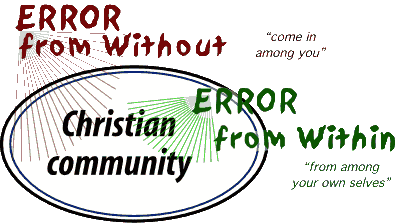Detecting Error Confronting the Christian Church
(Acts 20:20-28)
Paul J. Bucknell
Our Problem of Detecting Error
Do we have a biblical process of detecting or discerning error? Probably not. Just think for a moment about two issues.
of detecting or discerning error? Probably not. Just think for a moment about two issues.
First of all, the Christian community has accepted the common usage of the word 'cult. The word is okay in and of itself, but more than often, Christians assume all error is on the outside. This is not true. Paul and Jesus give us much evidence that error can lie within.
Secondly, many of God's people are not truth conscious. They do not regularly study the scriptures. They can not tell you why the deity of Christ is important or even more where the scriptures show the deity of Christ.
Where does this leave us? Very vulnerable to falsehood. With the added dimension of radio and television preachers, and a host of books and magazine articles, we have a big problem on our hand. We need a biblical perspective on dealing with error.
The apostle Paul in a dramatic farewell sermon cautioned the Ephesian elders as he was about to leave them. He warned them of two ways to be careful of error: error from within and error from within.
"Be on guard for yourselves and for all the flock, among which the Holy Spirit has made you overseers, to shepherd the church of God which He purchased with His own blood. I know that after my departure savage wolves will come in among you, not sparing the flock; and from among your own selves men will arise, speaking perverse things, to draw away the disciples after them". (Acts 20:28-30).
Error from without "come in among you" (Acts 20:29)
Outside problems are those trying to infiltrate the Christian community. The cults are the prime suspects because they are aggressive in trying to steal the sheep. The cults like Jehovah Witnesses and International Church of Christ are big organizations with printed literature. However, we should not limit our understanding to these groups. There are many individuals who are also casting their influence over the community of God's people. A church cannot steal sheep for it would still be in the fold. Only those who are not part of God's church can steal a sheep.
The Christian community has wanted us to accept the term cult to discern those groups with aberrant beliefs and practices that look like a Christian community but are not. And yet, because of their aggressive nature in propagating their beliefs, they threaten the security of the true believing community.
We need to be careful though. There are not only dangers from without but dangers from within. We do need to be careful protecting His people from those who propagate error such as cults. If we think this is the only place the threat of error is to be found, however, we would be in a most vulnerable situation. The main reason for this is that by identifying a certain group from which error comes, we tend to ignore the more subtle forms of error that threaten God's church in other ways.
Error from within "from among your own selves" (Acts 20:30)
 There will be those in which error has snuck into the hearts of different people in God's community. "from among your own selves men will arise, speaking perverse things, to draw away the disciples after them." Error delights in enticing itself into their minds, persuading them and then having them live and teach a life different than the gospel teaches. Paul counsels all of us in Acts 20:31 to be alert,
There will be those in which error has snuck into the hearts of different people in God's community. "from among your own selves men will arise, speaking perverse things, to draw away the disciples after them." Error delights in enticing itself into their minds, persuading them and then having them live and teach a life different than the gospel teaches. Paul counsels all of us in Acts 20:31 to be alert,
“Therefore be on the alert, remembering that night and day for a period of three years I did not cease to admonish each one with tears." (Acts 20:31).
We need to be diligent in keeping alert from both fronts. Paul says to Timothy,
"O Timothy, guard what has been entrusted to you, avoiding worldly and empty chatter and the opposing arguments of what is falsely called “knowledge”-- which some have professed and thus gone astray from the faith. Grace be with you." (1 Timothy 6:20,21).
Biblical Process of Detecting Error
At this point we should see that error and falsehood does threaten our Christian communities. How shall we understand and confront error? Our responses will be partly shaped through culture and gifting, but we need to keep the biblical model in our minds so that we do not avoid detection and confrontation of error.
Let us suggest three detection modules from the scriptures.
1) Jesus' method of Detecting Error (Sermon on the Mount in Matthew 5)
Six times Jesus catches the waywardness of those around Him by comparing what they said with the scriptures. Six times in Matthew 5 Jesus said, "But I say to you..." He first said what they believed and stated and then clearly proclaimed what the scriptures stated.
If we are serious about being disciples of Jesus Christ, then we need to be more discerning. We do this by loving God's Word. Some might study the philosophies around them, but Jesus instead chose to love His Father and spent time with Him and had His Word on His heart.
We often focus on doctrinal problems, but the problems of personal sins eludes our detection. This was not so with Jesus.
2) John's method of Detecting Error (1 John)
John in the book of 1 John gives three tests of a genuine Christian. We tend to focus on one or two but leave out a third. This would be the area we ourselves most likely have problems in.
1) Obedient to God's commands (Heart test)
"If we say that we have fellowship with Him and yet walk in the darkness, we lie and do not practice the truth" (1 John 1:6).
2) Embrace the truth (Doctrinal test)
"Whoever denies the Son does not have the Father; the one who confesses the Son has the Father also." (1 John 2:23).
3) Love for Others (Relational test)
"The one who does not love does not know God, for God is love." 1 John 4:8
In fact, all these commands are one. When we love the truth of God, we are loving God and all that He stands for. Inferior theology comes from the lack of devotion to God's wisdom and an over–affection of one's own supposed wisdom. When we love God, we will love what God loves. Obedience is simply ones heart purposely affirming His love for God by restraining His ways to match what God says is important.
3) Paul's method of Detecting Error (Colossians 2:8-23)
Right thinking and knowledge not only protects us but guides us into light. Ignorance of truth brings problems and then cements us in them. Ignorance is a malady that has an easy cure: humility, repentance and embracing truth.
Paul in Colossians 2:8-23 identifies a number of problems that Christians worldwide have regularly encountered.
Captive Thoughts |
Scripture |
Explanations |
Philosophy and empty deceptionColossians 2:8 |
"See to it that no one takes you captive through philosophy and empty deception, according to the tradition of men, according to the elementary principles of the world, rather than according to Christ." (Colossians 2:8). |
Ideas from men and the world propose a solution for the problems he faces. These philosophies seem credible at first but if tested by time and experience (which is always a mistake) , they would show their inability to help man. The solution is to see how Christ fulfills the need of man. |
Legalism - Judgmental ismColossians 2:16-17 |
"Therefore let no one act as your judge in regard to food or drink or in respect to a festival or a new moon or a Sabbath day-- things which are a mere shadow of what is to come; but the substance belongs to Christ." (Colossians 2:16,17). |
Many people are set on judging our behavior on insignificant issues. They seem to thrive on spotting others in the process of doing wrong. There is no sense of compassion or care but only the determination to be better than others. They are law-ruled rather than Christ-ruled. |
AsceticismColossians 2:18a |
"Let no one keep defrauding you of your prize by delighting in self-abasement and the worship of the angels, taking his stand on visions he has seen, inflated without cause by his fleshly mind." (Colossians 2:18). |
The early church all the way up to the present time faces the problems of asceticism or self-abasement. Asceticism differs from spiritual disciplines like fasting in that they belief the act is morally wrong or unspiritual. The ascetic thinks he finds intimacy with God through denying bodily pleasures. This is closely tied to the Eastern religions and their condemnatory views toward the body. This becomes work–oriented salvation. |
SpiritualismColossians 2:18b |
"Let no one keep defrauding you of your prize by delighting in self-abasement and the worship of the angels, taking his stand on visions he has seen, inflated without cause by his fleshly mind." (Colossians 2:18). |
Spiritualism seeks closeness with God through special revelations. We are not saying that God cannot speak through special revelations as dreams, angels and visions, but that they are no reason to make one think he is better than others or demand that others should seek God so. This becomes experience–oriented salvation. |
Jesus, John and Paul are just a few of many examples of godly men confronting error. The more we love the church, the more we will protect her.
Defining and Describing a Cult
Only understanding error from a biblical perspective, should we focus on the word cult. The cults are only one way error confronts the average Christian. The word 'cult' has both tight and loose definitions. The popular understanding of cult is quite extreme because the way the media usually paints a picture of extremists brainwashing their cult members into morbid plots. This is not the sense we use the term 'cult.'
A more workable and practical definition of cult for Christians focuses on three aspects:
1) False doctrine |
A cult deviates from one or more major Christian doctrines. By major, we mean clear doctrines that have been taught and agreed upon through the centuries mentioned in the main confessions including erring views of: Christ's deity, salvation by grace and the scriptures. |
2) Evil ways |
A cult often encourages evil practices. Sometimes they are sensual in nature, but more often it is in the controlling element where money and time is 'stolen' from people by fear and intimidation. |
3) Controlling or censoring |
A cult almost always uses fear and intimidation to control the people who have entered their group. They are not free to go. This fear and an inability to question leaders to their decisions are closely connected to cultish behavior. |
Not all cults have all three of these problems, at least they are not visible to most people. Problems in the area of false doctrine are most easily noticed if we can discern false teaching. Those who do not know what they believe about the Bible are very susceptible to cults. Each of us are responsible to know the scriptures well.
As a result, we are no longer to be children, tossed here and there by waves, and carried about by every wind of doctrine, by the trickery of men, by craftiness in deceitful scheming; (Ephesians 4:14, NASB).
Remove the false way from me, And graciously grant me Thy law.
|
One often does not detect the controlling element until one joins or tries to leave. The International Church of Christ (1) strongly emphasizes discipling Christians but becomes cultish by their overbearing pressure on people to give their money through their organization. They only notice the intense pressure when they try to leave. Their false teaching of baptismal regeneration brings people to focus on ritual instead of Christ's work. We see a strong spirit of exclusiveness by demanding their own baptism because their baptism is the only accepted one.
Cults then range from extremist groups that have nothing to do with Christianity (except their leader says they are the Christ such as the Moonies) to groups who have a strong and controlling leader that changes certain basic Christian doctrines. In summary be careful of any group that makes all those who do not belong to their own group as errant and gone astray. Cults thrive on exclusiveness.
We should start wondering whether some denominations should be called cultish. We agree they are not usually controlling of their members, but they have departed from the standard confessions of faith even if they still say they adhere to them. With departure in Christian belief is a host of evil practices which they would consider permissible.
Other resources:
Materialism versus spiritualism
Baptism of the dead
No resurrection
Compromise and subjectivism
Toleration: Five Arguments for fixed standards
Christ's Deity
_____________________________________
"Talking with Liberals"Background | What do you say? | Love for God | Running on Empty | An Open Mind
Understanding Beliefs
"How can I be born again?"
Lingering Shadows: Living in a World of Gods
Detecting Error Confronting the Christian Church (Acts 20:20-28)
Sharing the Gospel with Jehovah Witnesses
Dangers of Mormon Cult Teachings - The Latter Day Saints
Guarding Our Hearts from Error Within
The Choice against Secularism
The New Birth & Evangelism: Another Look at How to Share the Gospel or Witness
The Fascination of Light
The Empty Search of Man
The Moral Awareness of God
Springtime!
God's Ingenious Design
_____________________________________BFF Homepage | Top | Previous | BFF Topical Index | BFF Scriptural Index
Detecting Errors Within | Jehovah Witnesses | Mormons | Evangelize Cults
Counterfeit Faith: A study of humanistic faith
Biblical Foundations for Freedom
Paul J. Bucknell